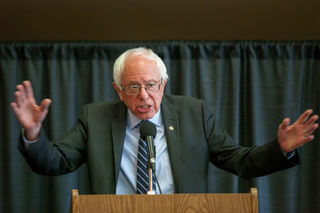Pessimism
Hillary Plays the Cynicism Card
How cynicism targets Sanders by squashing out our need for meaning.
Posted March 3, 2016

As a psychotherapist, I try to help people overcome the beliefs that cause them distress and inhibit them in life, beliefs about themselves and the world (usually acquired in childhood) that are unconscious but highly pathogenic. For example, some patients have the belief that they’re not supposed to have more of the good things in life than their parents had, or that they don’t deserve to be loved, or that they’re not supposed to be ambitious and successful. These beliefs are hard to change because they don’t feel like voluntary beliefs that are under the patient’s control. Instead, they feel like they are, simply, “the way things are and the way they’re supposed to be.” To believe otherwise is to risk the pain of rejection, shame, or failure.
At the heart of such beliefs is what I would call a personal form of cynicism. The world seems to be “wired” in a certain way and is immune to change or choice. In this way, the cynicism I see in my office is similar to the cynicism seen in political life. The latter is everywhere. “Politicians always lie,” “the deck is stacked against us,” “voting is rigged and useless,” and “there’s nothing the average citizen can do about it.” The cynic in us takes the world as it is and assumes that that is the way it has to be.
While ubiquitous in the Machiavellian world of politics, cynicism has reared its ugly head in a very particular way in the current spin around the Clinton-Sanders contest. Here’s the narrative that seems to be evolving: Clinton is the realist, Sanders the idealist. Clinton is practical; Sanders’ goals are high-minded but impractical. Clinton knows how to “get things done,” while Sanders is indulging in wishful thinking. Clinton knows how to pay for things, Sanders is grandiose and his programs will bankrupt the nation.
Such frame may have elements of truth but what’s clear is that it has become a popular story line. The problem is that it’s also fundamentally cynical and exemplifies the worst sensibility in contemporary politics.
Our political system is shot through with cynicism. The media creates and then revels in it. It’s so pervasive that someone who is not cynical risks being discredited and dismissed as naive, wide-eyed, and unsophisticated. Politics is like a house of mirrors in which attempts to be authentic are filtered through the lens of cynicism and emerge on the other side as mere examples of posturing. I would argue that that is precisely what we are seeing in the “spin” around Sanders and his idealism.
Cynicism is the result and expression of frustrated needs for meaning and purpose. We all come by it honestly. Everyone has needs for meaning and purpose, but everyone also risks embarrassment if they express these needs too publicly. The cynical side of our nature helps mitigate this embarrassment by keeping a lid on our more idealistic ambitions.
The psychic need for a higher sense of meaning and purpose is manifested in many different ways. It’s a need for significance. It’s a longing to be part of something bigger and better than our lonely and isolated selves. Spiritual traditions and practices express it most directly in our culture; religion, after all, speaks, at its best, to a need for transcendence. It’s also a wish to connect with and influence the future, to be part of the flow of history. Artists feel it. Social activists trying to change the world feel it. Parents who strive to provide their children with a better future tap into this need. People feel it in every walk of life. When communities turn out to help each other following a disaster, you can see it expressed. People get satisfaction from contributing to the whole, and from being part of a community of meaning seeking to influence history.
Conservative audiences have this need as well. Trump’s vow to make America great again speaks to it. Megachurches grow on the basis of gratifying this and other needs. Even ethnocentric calls for persecuting and expelling immigrants speak to the need for meaning and purpose in a perverse way—namely, that there is a “we” that is special but imperiled by a “them” and that if we get rid of “them,” we can realize the American Dream. It’s a dream that depends on a demonized Other, but it’s a dream nonetheless.
We know what happens when other needs are frustrated. When someone’s need for food is frustrated, he or she feels hungry and suffers starvation. When someone’s need for connection and relationship is thwarted, the result is loneliness and isolation. When someone’s need for a sense of agency—the feeling that he or she can influence the important aspects of life—is taken away, the result is a painful feeling of helplessness and even depression.
When the need for meaning and purpose is suppressed or inhibited, we feel cynical. For the cynic, current reality comes to seem hard-wired into the fabric of the universe and of human nature. Rather than challenge the limits that reality is presumed to impose, the cynical solution lies in lowering expectations and finding a way to live with only small and incremental changes in the status quo.
But because of its negative connotations, cynics invariably deny that they have this affliction. Instead, they claim that they are simply being realistic. For example, the belief that everyone is out for him- or herself is a cynical belief. So is the belief that the political and economic system is inevitably rigged to favor the rich and powerful. It’s not that these observations are inaccurate or that objective reality doesn’t routinely confirm them. It’s that they’re incomplete. Yes, people in our culture are selfish and, yes, the system is rigged against ordinary people. But these facts, while real, are not inevitable. They are subject to change. They were created and can, therefore, be modified by human intentions. Anyone who saw how New Yorkers helped each other after 9/11 and anyone involved in the great social movements for workers rights, civil rights, women’s rights, and LGBT rights has to admit that selfishness and helplessness are not immutable facts of life.
Cynicism doesn’t just remind us that there are limitations in the real world; it fetishizes them, makes them into enduring things that stand apart from and opposed to us. Denying the reality that we can influence the way things are, cynicism constantly cautions us to play it safe and lower or moderate our expectations.
Cynicism has corroded our political system in devastating ways. One manifestation is the low rate of voter registration and turnout. The United States has one of the lowest voter turnout rates among all the economically advanced democracies in Europe and Asia. Only 36% of eligible voters turned out to vote in the midterm elections here in 2014, the lowest percentage for a midterm turnout since 1942. During Presidential election years, turnouts are higher (Obama in 2008 enjoyed a 57% turnout and, going back to Presidential contests in the 1960s, participation rates were in the low 60% range), but still pathetically low. Factoring in voter registration statistics, we have to face the startling fact that in 2012, a Presidential election year with pretty good voter turnout, almost 73 million Americans who were eligible to vote did not do so. Only a little more than half of adult Americans voted. And, finally, a recent study done by the California Voter Federation found that almost 70% of infrequent and non-voters in that state were under 30 years of age. While “convenience” was a top complaint, two-thirds of the survey’s respondents also shared the perception that politics are controlled by special interests. Under such conditions, it’s understandable that many people simply feel “Why bother?” What better expression of cynicism could there possibly be?
Progressive critics will immediately point out that we have been faced with so little choice in our electoral decisions, endured so many “lesser-of-two-evils” votes, that the cynicism of the non-voter is surely realism in it’s purest form. But even when we had the 2008 version of Obama to vote for, almost half of eligible voters stayed home. The system most certainly is rigged but not completely, and when someone like Bernie Sanders comes along and talks about political revolution, political energies that are latent are awakened and “why bother” starts to “feel the Bern.”
Thus, it is of crucial importance to note that just because people’s need for meaning and purpose is thwarted, that need doesn’t then go away. It lies there, waiting to be activated by the right kind of person and the right kind of appeal. It’s why many people turn to spirituality or political activism. It’s one reason so many people respond to passionate and visionary oratory. Our need for meaning and purpose, for a sense of significance, is expressed in our desire to be inspired, to transcend what is and believe in what could be. I think that this explain some of the passion felt for Obama in 2008 and Bernie Sanders in 2016, just as, in earlier times, it explained some of the powerful popular response to Bobby Kennedy and Martin Luther King. People are not responding to empty rhetoric. These speakers are awakening in them a longing to be inspired, to feel bigger and better than they feel in ordinary everyday life. When leaders succeed in this, listeners become engaged.
The fact that people want to escape or be elevated out of their ordinary lives is understandable given the ways that we so often feel deadened by cynicism and by the belief that suffering, distress, disappointment, passivity, and helplessness are inevitable and natural. In other words, by describing the world in terms of possibility, rather than inevitability, these charismatic leaders are directly challenging a social and psychic malaise too often experienced in contemporary life.
But such an explanation is too simplistic. To really resonate with and engage people, a vision has to hit the right note. If it’s too mundane, our cynicism is confirmed and, while agreeing with it in principle, we don’t get engaged. If the vision is too grandiose as to be obviously impossible, we shrug it off as irrelevant to our experience. But if an inspiring vision is offered up that is neither too small or big, our longing to be part of something meaningful and grander than ourselves get stimulated and we want to be engaged with realizing that vision.
The problem is that when we do awaken this longing, we put ourselves out on a limb—in danger—because we then risk being disappointed. We become vulnerable to being told we’re naïve, that “the numbers don’t add up,” that we’re being duped into shooting too high. Being called “naïve” is especially shaming. It’s like being called weak, innocent, or vulnerable like a baby. The cynic is insulated from these accusations. While the need for meaning and purpose remains universal, cynicism is equally ubiquitous because it helps defend us against painful accusations of appearing “impractical,” (and, thus, foolish) and “idealistic,” (and, thus, easily disappointed).
And this isn’t an irrational fear. Time and again, liberals have had their hopes for something politically transcendent raised and then dashed. It happened, for some of us, when a charismatic Bill Clinton won in 1992, but then invented “triangulation,” gutted welfare rolls and helped pass legislation deregulating banks. I think it happened with the 2008 Barack Obama who called us to our better and higher selves during his campaign (“Yes, We Can!”) and then, upon taking office, almost immediately retreated into pyrrhic compromises with Republicans and an approach to economic disaster that preserved the basic status quo even as it eked out a few victories (e.g. the ACA, consumer protection, low-level financial regulation, etc.). Each one stimulated a thirst in many to be part of a movement. And each left many people at the altar, so to speak, disappointed that the movement they hoped for had again succumbed to business as usual.
This is the psychological dynamic behind some of the current attacks on Bernie Sanders, both by Hillary Clinton supporters, as well as by a significant portion of the media. Whatever you think of the political feasibility of his programs or his electability, Sanders’ plain-spoken manner, enthusiasm, and passion about economic inequality momentarily break through the drone of policy wonks and Washington “insiders” who react defensively by cautioning us to be realistic and, above all else, to be ready, at any moment, to vote for the lesser of two evils. Having momentarily awakened us from our political sleep, Sanders inevitably triggers our cynical defenses. He’s a naïve idealist, the cynic in all of us whispers. Play it safe and support someone who knows the rules of the game and how to win it.
In truth, Hillary Clinton’s goals and ideals may be as high as Sanders’. But she has chosen to present herself as the candidate that practical people should vote for, the candidate for realists, pragmatists, and down-to-earth rationalists. Clinton’s “realism” hides its underlying cynicism, one that mirrors the cynical political zeitgeist that all of us assume is the natural state of affairs.
Sanders, for better or worse, challenges cynicism. True, many people who support Clinton do not fit into these caricatures and feel, themselves, genuinely inspired by her story and her ideas. But Hillary’s campaign and the media in her camp are putting special emphasis on the distinction between her realism and Sanders’ impossible idealism. They are playing the cynicism card.
The media that is crucial in framing this contest is cynicism on steroids. The so-called mainstream commentariat weighs in on the “horse race” dimension of presidential politics as if the talking heads don’t themselves have their own personal conflicts over feeling inspired and disappointed and haven’t, themselves, “settled” for “realistic” change at the margins in the political arena.
Media personalities are supposed to be savvy judges of reality (at least savvier than the rest of us) and, therefore, have a special aversion to and dread of sounding “naïve. Thus, their cynicism is amplified. In their world, no one is ever what they seem, never authentic. Candidates “pivot” rather than change their minds. We learn that narratives are being constructed rather than points of view being expressed. Campaigns double down as opposed to emphasizing or reiterating something important. The talking heads are there to decode the game: Everything is a pose, a strategy, a spin, an attempt at manipulation. Even a politician’s tears can become, in their view, a chess move in a game of which they are the narrators. The rest of us can only be passive observers.
Again, media cynics in these examples are not wrong; they are being realistic, but their realism is grossly incomplete. They don’t own their own contribution to the phenomena about which they’re reporting and they prefer to handicap the horses for us rather than give us a meaningful racing form with which we can independently understand political reality. They screen reality and make sure that we know that they know that everything is really a kabuki dance devoid of genuine passion or purpose.
Cynicism is a corrosive force in our politics and culture, but one that is invisible to us because it seems so normal. My patients feel the same way. They keep repeating patters that are familiar and experience deviations from these scripts as anxiety provoking. It’s my job to help them see, through education and by creating new corrective experiences in which they are encouraged to freely choose a healthier way to be, that their emotional reality and distress are not something hardwired and inevitable. My underlying message is that transformational change is possible.
Progressives need to convey this same message in the broader political arena.
The problem we face is that political cynicism of the sort that suffocates us today masquerades as realism, a realism that warns us that transformational change is a pipe-dream and that aspiring to what we really want is a recipe for shameful disappointment. When a patient conveys this belief, I see it as a symptom of an emotional injury rather than objective reality and I seek to change it, not surrender to its inevitability.
It seems to me that that’s what a progressive movement should be doing on a social level; namely, challenging cynicism and drawing people to our cause because our cause is big and grand and mirrors their own buried wish to be part of something just that big and grand. We need leaders who can present such a vision and fight the “realists” who want us to be afraid of our own deepest longings.




